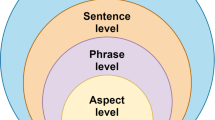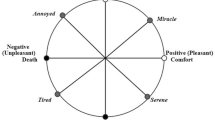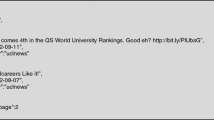Abstract
Since the continuous proliferation of the journalistic content online and the changing political landscape in many Arabic countries, we started our current research in order to implement a media monitoring system about the opinion mining in political field. This system allows political actors, despite of the large volume of online data, to be constantly informed about opinions expressed on the web in order to properly monitor their actual standing, orient their communication strategy and prepare the election campaigns. The developed system is based on a linguistic approach using NooJ’s linguistic engine to formalize the automatic recognition rules and apply them to a dynamic corpus composed of journalistic articles. The first implemented rules allow identifying and annotating the different political entities (political actors and organizations). Then these annotations are used in our system of media monitoring in order to identify the opinions associated with the extracted named entities. The system is mainly based on a set of local grammars developed for the identification of different structures of the political opinion phrases. These grammars are using the entries of the opinion lexicon that contain the different opinion words (verbs, adjectives, nouns) where each entry is associated with the corresponding semantic marker (polarity and intensity). Our developed system is able to identify and properly annotate the opinion holder, the opinion target and the polarity (positive or negative) of the phraseological expression (nominal or verbal) expressing the opinion. Our experiments showed that the adopted method of extraction is consistent with 0.83 F-measure.






Similar content being viewed by others
Notes
References
Abdul-Mageed, M. & Diab M. (2012a). AWATIF: A multi-genre corpora for modern standard arabic subjectivity and sentiment analysis. LREC, Istanbul, Turkey
Abdul-Mageed, M. & Diab, M. (2012b). Toward building a large-scale arabic sentiment lexicon. In Proceedings of the 6th International Global WordNet Conference.
Abdul-Mageed, M., Diab, M. T., & Korayem, M. (2011). Subjectivity and sentiment analysis of modern standard Arabic. In Proceedings of the 49th Annual Meeting of the Association for Computational Linguistics: Human Language Technologies: short papers (vol. 2, pp. 587–591). Association for Computational Linguistics.
Abdul-Mageed, M., Diab, M., & Kübler, S. (2014). SAMAR: Subjectivity and sentiment analysis for Arabic social media. Computer Speech & Language, 28(1), 20–37.
Alaa El-Dine, A. H., & Fatma El-zahraa, E.-t. (2013). Sentiment analyzer for Arabic comments system. International Journal of Advanced Computer Science and Applications.
Amira, F. E. G., Torky, I. S., Maha, A. H., Mohamed, M. E. D. (2013). A computational approach for analyzing and detecting emotions in Arabic text. International Journal of Engineering Research and Applications (IJERA), 3, 100–107.
Bing, L. (2010). Sentiment analysis and subjectivity. In Handbook of Natural Language Processing, (pp. 627–666). Boca Raton, FL: CRC Press.
Esuli, A. & Sebastiani, F. (2006). SentiWordNet: A publicly available lexical resource for opinion mining. In LREC06.
Farra, N., Challita, E., Assi, R. A., & Hajj, H. (2010). Sentence-level and document-level sentiment mining for Arabic texts. In IEEE International Conference, (pp. 1114–1119).
Maamouri, M., Bies, A., Buckwalter, T., & Mekki, W. (2004). The penn arabic treebank: Building a large-scale annotated arabic corpus. In NEMLAR conference on Arabic language resources and tools (vol. 27, pp. 466–467).
Mathieu, Y. Y. (2005). Annotation of emotions and feelings in texts. In International Conference on Affective Computing and Intelligent Interaction (pp. 350–357). Berlin: Springer.
Mesfar, S. (2008). Analyse morpho-syntaxique et reconnaissance des entités nommées en arabe standard. Thèse, Université de franche-comté, France.
Mesfar, S. (2010). Towards a cascade of morpho-syntactic tools for Arabic natural language processing. In Proceedings of CICLing 2010, LNCS 6008, (pp. 150–162).
Pang, B., Lee, L. & Vaithyanathan, S. (2002). Thumbs up? Sentiment classification using machine learning techniques. In Proceedings of the ACL-02 conference on Empirical methods in natural language processing. Association for Computational Linguistics, (pp. 79–86).
Strapparava, C. & Valitutti, A. (2004). WordNet-Affect: An affective extension of WordNet. In Proceedings of LREC (vol. 4, pp. 1083–1086).
Silberztein, M. (2015). La formalisation des langues : l’approche de NooJ. ISTE Ed.: Londres (p. 426).
Vernier, M. & Monceaux, L. (2009). Enrichissement d’un lexique de termes subjectifs à partir de tests sémantiques.
Wiebe, J. M., Bruce, R. F. & O’hara, T. P. (1999). Development and use of a gold-standard data set for subjectivity classifications. In Proceedings of the 37th annual meeting of the Association for Computational Linguistics on Computational Linguistics. Association for Computational Linguistics (pp. 246–253).
Author information
Authors and Affiliations
Corresponding author
Ethics declarations
Conflict of interest
The authors declare that they have no conflict of interest.
Rights and permissions
About this article
Cite this article
Najar, D., Mesfar, S. Opinion mining and sentiment analysis for Arabic on-line texts: application on the political domain. Int J Speech Technol 20, 575–585 (2017). https://doi.org/10.1007/s10772-017-9422-4
Received:
Accepted:
Published:
Issue Date:
DOI: https://doi.org/10.1007/s10772-017-9422-4




